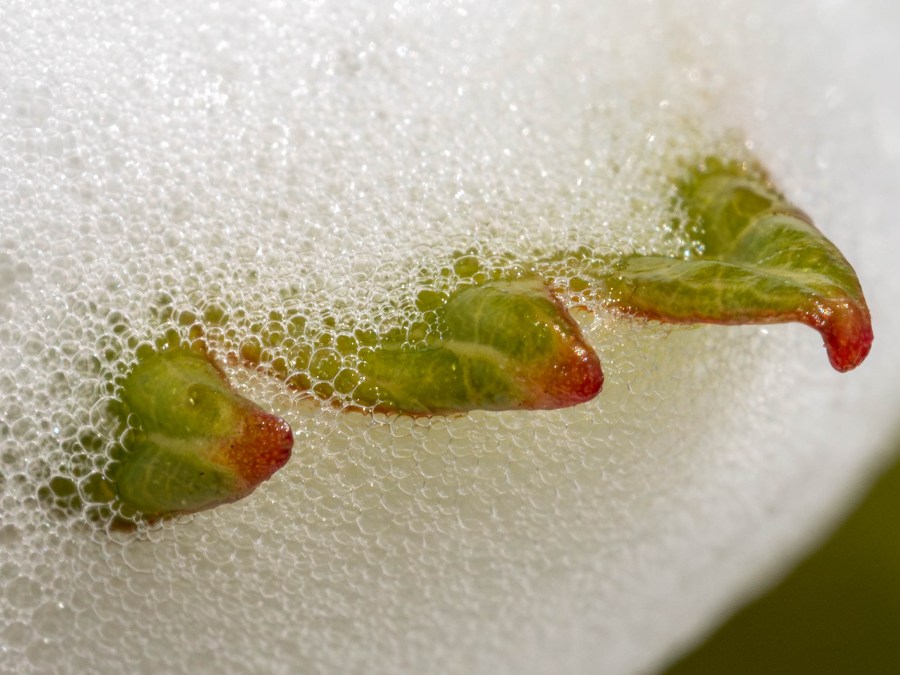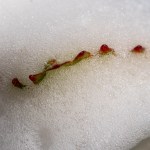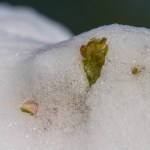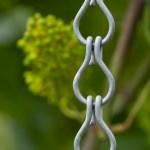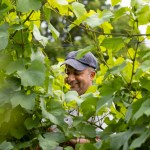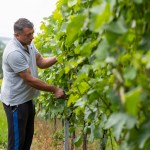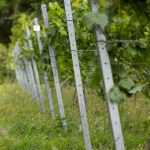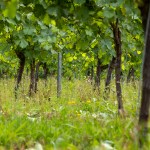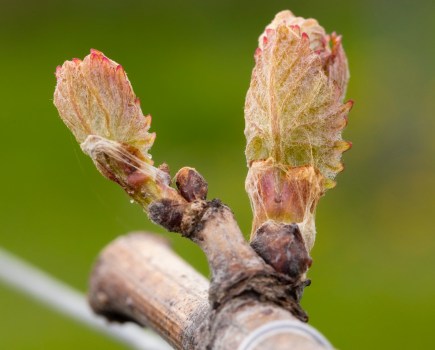The aqueous foam, which is environmentally harmless and expected to be much cheaper to use than current alternatives, has been developed over the past six or seven years by George Klat, himself a grower, and is expected to revolutionise the industry.
George’s company, Frosco Ltd, has worked with scientists at Imperial College London, to perfect the foam, which is described as being “ultra-stabilised by a quantum effect at the molecular level” and will also protect crops of all kinds from extreme weather conditions, as well as acting as a fungicide and pesticide.
It will be distributed in the UK by Vinecare UK, one of the most respected vineyard management companies in the industry and ideally placed to help growers benefit from the breakthrough.
Vinecare UK’s Paul Woodrow-Hill, who has worked closely with vines, growers and winemakers since 1987, has been following the development of the product and offering advice and support during the journey.
As well as offering a broad range of management, consultancy and contract labour services, Vinecare UK grows its own grapes for contract sale across 14 hectares of land in the south east, giving Paul and his team a hands-on perspective. He is convinced that the new product will have a major impact on the industry.
“It will be an absolute gamechanger,” he commented. “This is a harmless, completely stable, environmentally friendly foam that will protect vines against up to ten degrees of frost and can just be washed off when the job’s done. It also has fungicidal and biocidal properties and is likely to cost about half as much as more traditional anti-frost measures.”
One of the current methods of keeping frost at bay, burning large paraffin candles, or bougies, is not just expensive but damaging to the environment, while doing nothing risks devastating damage to grape buds. George pointed out that a single late spring frost across Europe in 2017 caused losses estimated at €3.3 billion, with only 18% of the crops insured.
The inspiration for Frosco was George’s observation that a snow fall had a “perhaps counter-intuitive” beneficial impact on overwintering root crops by trapping air within its crystalline structure, insulating the crop and keeping the ground above freezing. He also noticed the protective foam produced by froghopper nymphs or spittlebugs – otherwise known as cuckoo spit – which protects the nymphs from UV radiation and predators.
The challenge was to create a liquid that could be easily changed into a foam so that it could be applied to the vines, but which would remain as a foam and not turn back into a liquid until the threat of frost had passed the following morning.
Frosco is designed to be applied with foam lances as frost approaches. When the temperature approaches zero, the borders between each individual bubble start to crystallise, trapping air in thousands of tiny pockets and insulating the crop. The formulation then stays intact until the next day, when it can be washed off with water to allow insects to go about their pollination business.
“As frost generally occurs on still clear nights the threat of being washed off by rain is minimal,” George added.
Frosco then worked with the molecular engineering hub at Imperial College to make the foam thermally resistant and prevent any temperature changes. The result is a unique formulation that provides 10°C of protection in both directions, which means it can be used to protect against excessive heat as well as frost. Preventing berry scorch is just one of the additional areas where Frosco could prove useful.
“The possibilities of this technology are almost endless,” George commented. “It could be used across the world to protect wheat, coffee, peaches, apples and almost any other crop from temperature extremes. It’s like we’ve come up with the ‘WD40’ of agriculture.”
One unexpected benefit is that the long contact time of the foam with the plant, combined with its high pH, means aphids are first trapped and then killed by Frosco. It also acts as an aroma barrier, so no other aphids are attracted to the plant. Because the foam is essentially liquid based, it is similar to a cloud, allowing photosynthesis to continue to take place in a stable temperature.
Paul and the Vinecare UK team were the clear choice as the UK distributor to take Frosco forward, having supported and encouraged George throughout its development. Paul also helped set up a field trial for the product at Plumpton Agricultural College.
“The trial worked well in demonstrating how the product works and highlighting the stability of the foam, but ironically we chose a year in which there was no significant frost,” commented Paul. “All the other lab tests, research and trials shows it will do exactly what it says on the tin, though, and we are delighted to have been asked to act as the sole distributor for the UK.”
Developer George has a vested interest in the success of his invention, since he has his own five-acre Wolf Oak vineyard at Knowl Hill in Berkshire, an enterprise that benefits from management support provided by Vinecare UK.
A keen environmentalist, he was determined to come up with a frost protection solution that was totally sustainable and contained no toxins. Paul believes his answer to this long-standing and potentially catastrophic threat will open up many more wine-growing sites that are currently felt to be too risky.
And that, he believes, will be a good thing for the industry, which is currently demanding more and more grapes to meet the demand for English wines. “Winemakers across the region are always looking for more fruit,” he said, adding that he felt many of the vineyards he managed were likely to achieve an impressive 12 tonnes per hectare this season.
The demand for fruit is reflected in the success of The Grape Exchange, an online platform Paul set up to bring together buyers and sellers and formalise a process which had been “just a bit too informal” in the past.
“Lots of deals were being done on handshakes, but that sometimes led to problems and disagreements down the line,” he explained. “Now buyers and sellers can register on the site and make deals online that are binding on both parties.”
The Grape Exchange, now in its third year, has also helped to create good returns for growers, who can now expect £3,000 a tonne or more for popular, in-demand sparkling wine varieties.
It was introducing the demand and supply-based auction platform and helping the price find a sustainable level that prompted Vinecare to invest in growing grapes as well as helping others do so. The company now leases a number of sites, including the five acre Trotton Estate vineyard near Rogate in West Sussex where Vineyard photographer Martin Apps took these photographs. The sandy soil is ideal for the classic Chardonnay, Pinot Noir and Pinot Meunier varieties, grown alongside small parcels of Pinot Gris and Bacchus.
With 36 years’ experience in viticulture, Paul has worked at a number of the South East’s best-known vineyards. After joining Nyetimber in 2006 he oversaw the vineyard’s expansion from 35 acres to 435 acres in just five years.
It was in 2011 that he set up Fruits of Labour to bring overseas workers to the UK to help growers across the industry find seasonal workers. Four years later he rebranded the company as Vinecare UK to reflect what had quickly established itself as his primary market.
He is not a fan of Brexit, which has now left him unable to meet the demand he faces for seasonal workers. His 150-strong workforce of people with settled or pre-settled status is just about enough for the contract work he does for most of the year but leaves him having to do a fair bit of juggling at harvest time.
“We once had a labour force of 800, but I just can’t get anywhere near that number now,” he said. “And I can’t make use of those brought in under the temporary seasonal worker scheme because I’m not an end user. It’s having a big impact across the industry.”
As well as regularly supplying labour to more than 30 vineyards, Vinecare UK supports clients across the south and south east with advice and management support and looks after around 15 vineyards, generally smaller sites of ten acres or fewer. “The sort of size where the owner needs professional advice and support but can’t justify employing a full-time vineyard manager,” Paul explained.
As well as caring for vineyards on a contractual basis, Vinecare UK also provides services such as planting and trellising. While some vines are still planted by hand, in most cases Paul brings in German contractor Minges, a tried and trusted fifth generation family firm with the experience to match.
The Vineyard Store is another of Paul’s ventures, a one-stop shop for vineyard supplies including wire, vine tutors and the usual broad range of fixtures and fittings. The Vineyard Store is also the UK’s sole distributor of Magon posts, constructed of galvanised, construction grade European-mined steel and retailing at about half the price of leading brands.
The store in Lewes, Sussex is open for face-to-face visits by appointment only, but is always available online. It’s clearly a sign of the times that the warehouse is about to be doubled in size to meet demand.
While Paul is clearly a hands-on character, he is quick to pay tribute to the support of vineyard manager and The Grape Exchange director Steve Burnett, while office manager Jo Healy is another vital member of the Vinecare UK team.
- Paul Woodrow-Hill
- George Klat
For more like this, sign up for the FREE Vineyard newsletter here and receive all the latest viticulture news, reviews and insight

